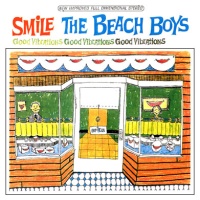|
...
Section One
Section Two
Section Three
Thoughts, which deeply rest at evening,
At sunrise gaily thrilled the mind;
Songs whose beauty now only lies in memory
Youth would sing with rapture,
Sing from joyous buoyant impulse
Knowing naught what he was singing,
Thus would God reveal the range of Soul!
(Charles Ives,
1921)
______________________________________
When Brian Wilson smiles
The impossible will seem commonplace
And the songs of time will light on the cherub face.*
______________________________________
“Smile was the album that never was…”
(Paul Williams,
Crawdaddy, 1967)
______________________________________
The lonely sea, the lonely sea,
It never stops for you or me
It moves along from day to day.
That’s why my love, that’s why my love,
You’ll never stay, you’ll never stay…
You’re like the lonely sea.
(“The Lonely
Sea” by Brian Wilson & Gary Usher, 1962)
______________________________________
“The smile you send returns to you.”
(Indian proverb)
 eave it to the enigmatic former Beach Boy Brian Wilson—composer of our
permanent themes of summer, architect of the musical spheres that lifted
the craft and technology of recording songs to a place in the sun,
magician of harmony, master of melody, poet of simple joys, collaborative
surf rider of musical tidal motifs of discovery and loss, broken child of
inspiration, shaman of introspection, sand shepherd of sleep, arch
alchemist of American musical styles, abused son of the father of the
child to the man, brother’s keeper to a cousin’s Cane, tether to the long
haired promise of teenaged love, lost friend of the monkey on his own
back, and the most merciful embodiment of hope, bliss and redemption rock
music has ever known—leave it to our once fat and eternally beloved dumb
angel to deliver Smile right on time. eave it to the enigmatic former Beach Boy Brian Wilson—composer of our
permanent themes of summer, architect of the musical spheres that lifted
the craft and technology of recording songs to a place in the sun,
magician of harmony, master of melody, poet of simple joys, collaborative
surf rider of musical tidal motifs of discovery and loss, broken child of
inspiration, shaman of introspection, sand shepherd of sleep, arch
alchemist of American musical styles, abused son of the father of the
child to the man, brother’s keeper to a cousin’s Cane, tether to the long
haired promise of teenaged love, lost friend of the monkey on his own
back, and the most merciful embodiment of hope, bliss and redemption rock
music has ever known—leave it to our once fat and eternally beloved dumb
angel to deliver Smile right on time.
Smile is the album that now is. In September ‘04, Brian Wilson
delivered his long unpromised, but faithfully anticipated holy
masterwork—his teenage symphony to God. Thirty-eight years after
releasing what most serious lovers of popular music consider the greatest
work of progressive pop—the Beach Boys Pet Sounds—Wilson, in a
renewed collaboration with lyricist Van Dyke Parks, and accompanied by his
great touring band, The Wondermints, released a sparkling new
recording of the legendary Smile album. Originally called Dumb
Angel, Smile was
 and is a fragmented, wonderfully demented
amalgamation of impossible ideas about childhood, America, reverence, and
absolution—lyrically conjured by the even more enigmatic Van Dyke Parks,
and musically grounded by Wilson’s astonishing ability to orchestrate the
most illogical instruments into a musical symmetry that defies assumptions
about what our ears can enjoy. Crowning the poetry and architecture of the
songs are Wilson’s celestial melodies. Funny, pretty, sublime,
heartbreaking. A forensic autopsy of Wilson’s musical substance would
reveal that his heart was made of melody and his blood of harmony, both
which would make Salieri drool once again, and would be looked upon with
envy by the likes of Mozart and the late Leonard Bernstein. The Maestro,
along with Paul McCartney, George Martin, Paul Simon, Elvis Costello and
Randy Newman— all archdeacons of the written song—share the Eucharist of
Brian Wilson’s gifts and laud him as genius. Wilson himself would respond:
“I’m not a genius. I’m just a hard working guy.” and is a fragmented, wonderfully demented
amalgamation of impossible ideas about childhood, America, reverence, and
absolution—lyrically conjured by the even more enigmatic Van Dyke Parks,
and musically grounded by Wilson’s astonishing ability to orchestrate the
most illogical instruments into a musical symmetry that defies assumptions
about what our ears can enjoy. Crowning the poetry and architecture of the
songs are Wilson’s celestial melodies. Funny, pretty, sublime,
heartbreaking. A forensic autopsy of Wilson’s musical substance would
reveal that his heart was made of melody and his blood of harmony, both
which would make Salieri drool once again, and would be looked upon with
envy by the likes of Mozart and the late Leonard Bernstein. The Maestro,
along with Paul McCartney, George Martin, Paul Simon, Elvis Costello and
Randy Newman— all archdeacons of the written song—share the Eucharist of
Brian Wilson’s gifts and laud him as genius. Wilson himself would respond:
“I’m not a genius. I’m just a hard working guy.”
Smile is the music that scared the Beatles into making Sgt.
Pepper. In the mid-60’s, Wilson’s star had shone brilliantly in the
eyes of the Fab Four, George Martin, the Rolling Stones, Eric Clapton,
Andrew Loog Oldham, Roy Wood, Dave Edmunds and every over-reaching Anglo
pop artist searching for what Brian Wilson was creating—a kind of
perfection already achieved by Pet Sounds. Wilson’s fully realized work
gave promise to the possibility that rock and pop traditions could
progress orchestrally, classically, and narratively. Things could get
serious and remain fun. Smile, the greatest intentioned gesture of that
promise, collapsed under its own ambition as the purity of the intent
could not contend with Brian’s deteriorating mental health, the avarice of
the marketplace, and, most cruelly, the betrayal of his own blood. The
tired hang-ten-piston-bored-car-crazy-cutie formulas that made
millionaires out of his family and friends were an albatross pecking away
at Wilson’s creative entrails and haunted his every muse. “O once holy,
now unholy, blasphemous, adulteress muse, why art though made hollow
through the self-swallow of thy fallow bliss and comfort?”
(F.Z. Prygsquar).
Sorry. So Pepper came and Smile disappeared; the Beatles
reigned and Wilson went to bed.
Don’t get me wrong: I am a Beatles fan and I fully recognize that 95% of
what they recorded is a permanent and rich element of the musical oxygen
we will breathe forever. I marvel at everything they did. I honor the
tribulations and triumphs of their respective psyches, histories, and
their individual contributions to their collective creations; I despair
that we will never see their likes again. Their prodigious output descends
from American, western, and global musical archetypes and reminds us of
the essence of universal folk traditions. The revolution within their own
music to refine and subvert these traditions is the revolution of the mind
raising the ire of the spirit seeking art and transcendence. We screamed,
we sang, we danced, we listened, we disappeared, we thought, we turned on
and turned in awe. But they never broke my heart until they broke up. The
Beatles were in my head; the Beach Boys were in my heart. Brian Wilson
always broke my heart.
There’s a place where I can go
and tell my secrets to
In my room, in my room.
Now it’s dark and I’m alone
but I won’t be afraid
In my room, in my room…
(“In My Room” by
Brian Wilson & Gary Usher, 1963)

If you were a boy in the early 60’s and you had to endure the cultural
remnants of the pink Cadillac and purple gang machismo of the 50’s; and if
you were worried that the new behavioral paradigms facing the teenage male
in the 60’s would be equally brainless, you only had to skip over Brian
Wilson’s surf and hot rod tunes to know that there was something new about
the girls on the beach, and that summer and love were certainly possible,
but heartache and disappointment were soon to follow.
There was no getting around how much fun, fun, fun the Beach Boys were,
but more than sand was being kicked in the face of the kids of the 60’s.
Behind the cheerful lyrics were the melodies of generational melancholy.
While Brian Wilson used hot-rod-surfer brother Dennis as the
free-associative metaphor for all that was the California dream, he
himself was beached with self-doubt and exasperation, unable to grasp the
nightmare around him. We know today that Brian Wilson suffered all manner
of abuse and envy from his father, and suffered equally from the
indifference of those around him who only wanted to run wild with him as
long as he was creating the California myth and generating fortunes for
the legions of sycophants leeching from his wild honeyed pop hits. When
Wilson sought deeper answers from the complex sun-moon, ocean-sand,
hemi-headed-road muses which so inspired his early work, the borrowed
musical architecture of Phil Spector, the Four Freshman, the Ventures and
Montovani gave way to drier, fuller, better recordings, the inclusion of a
fifth and sixth harmonic voice, orchestration more appropriate to Wilson’s
blossoming melodic sense, and a symphonic pitch to a kind of
side-of–the-road arrangement of sounds that had more to do with
subtracting and dividing aural landscapes than adding to and multiplying
them.
NEXT SECTION
Section One
Section Two
Section Three
To learn more, visit the website at
http://www.brianwilson.com/
|